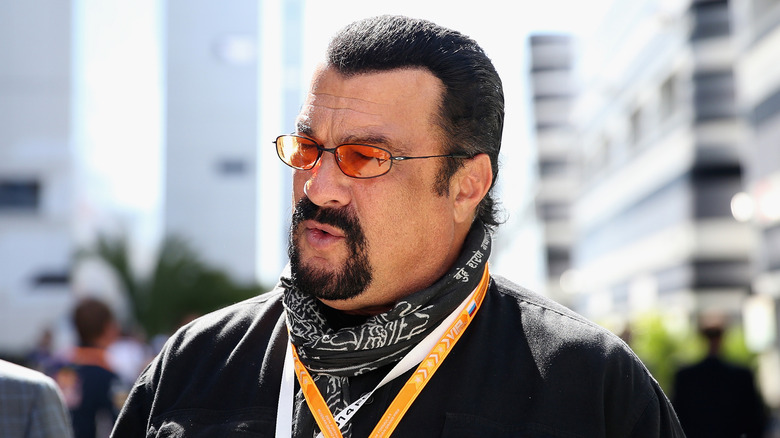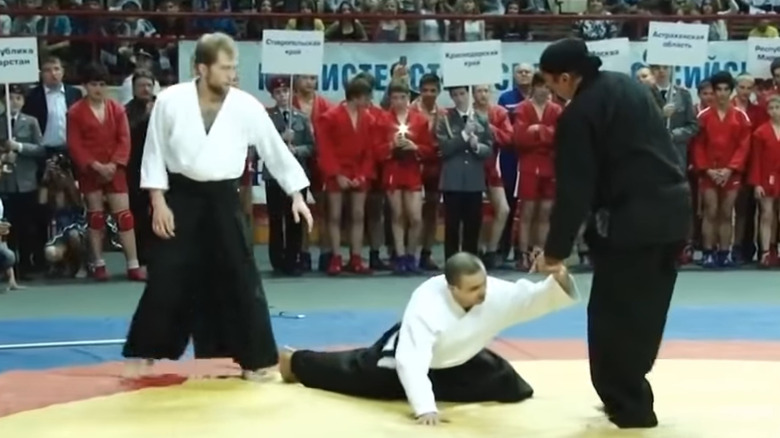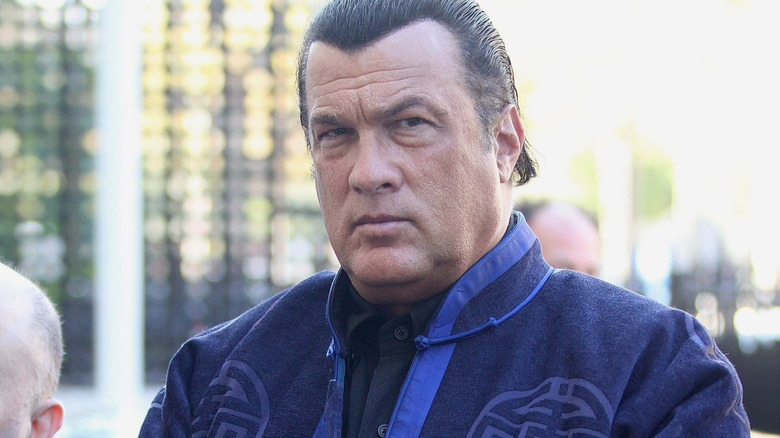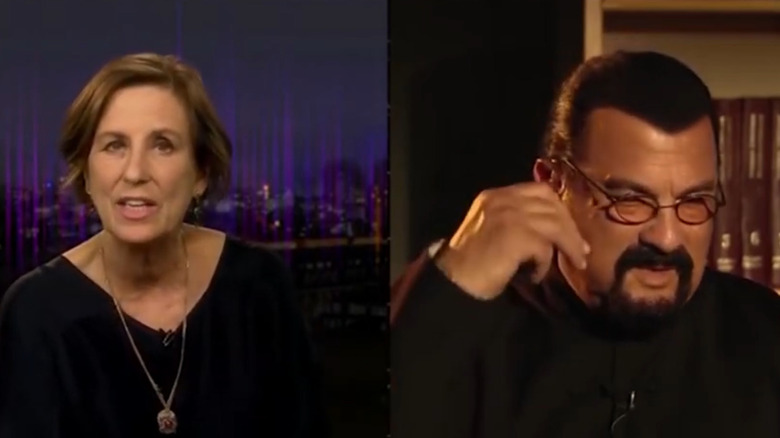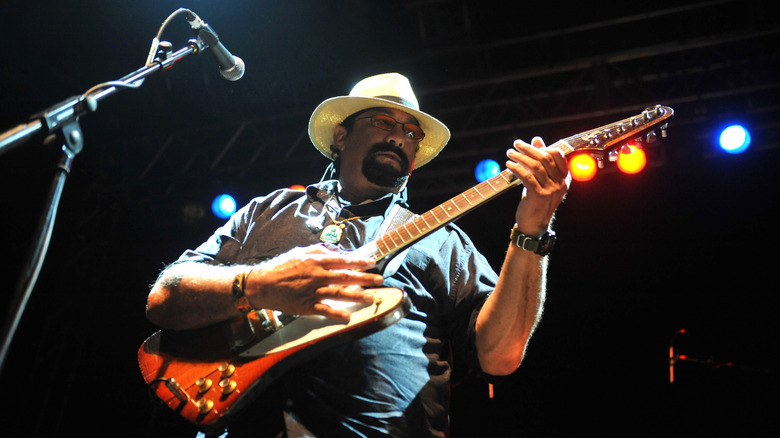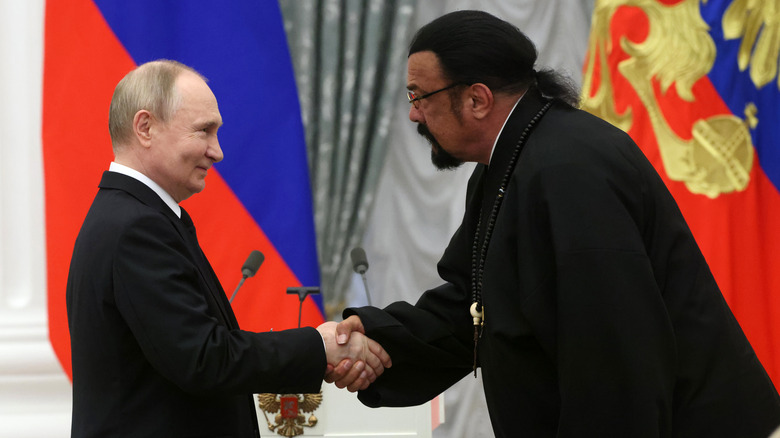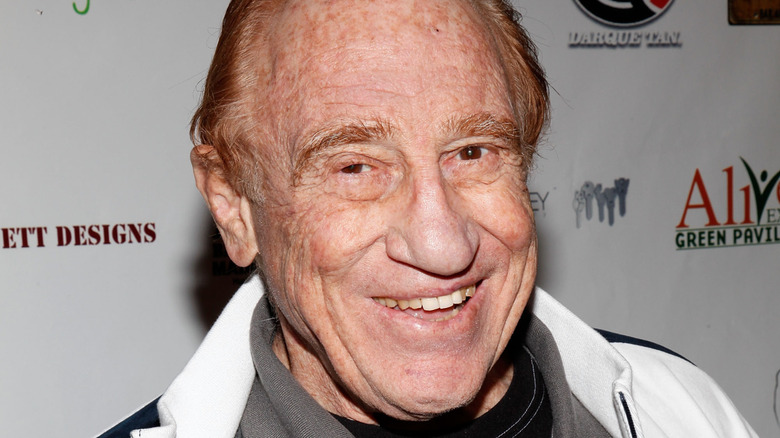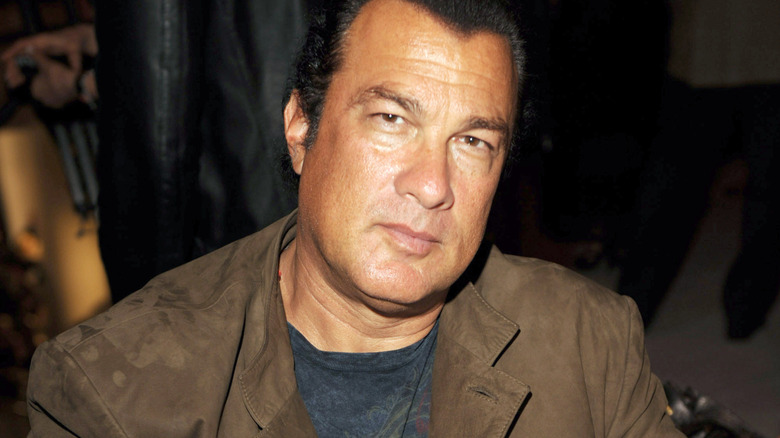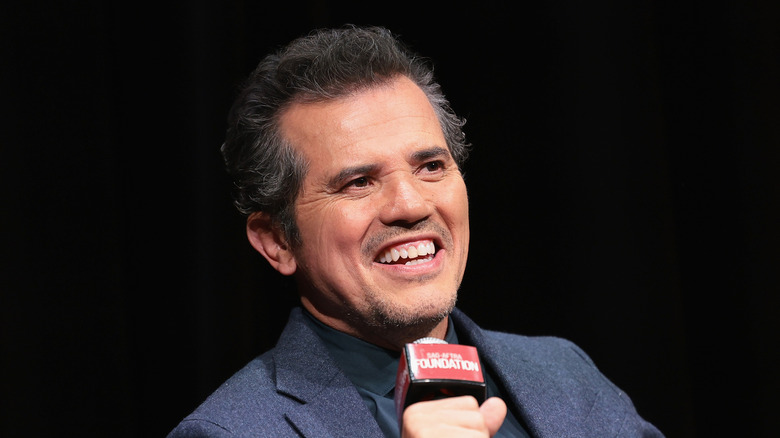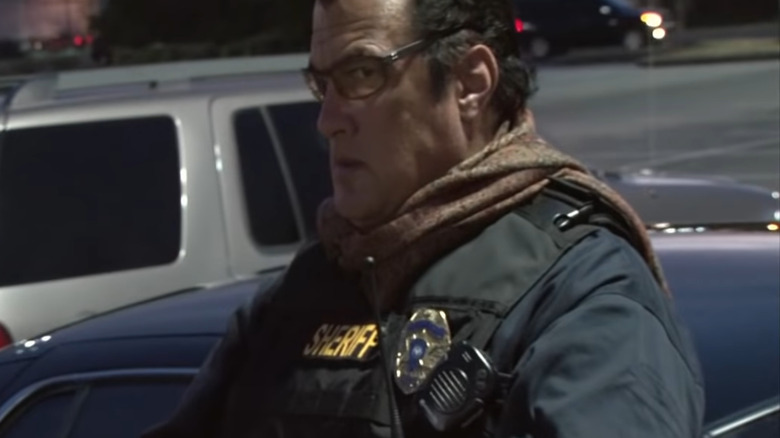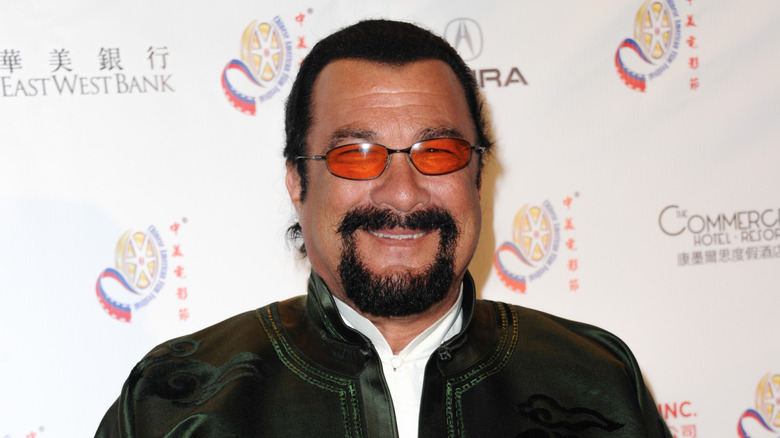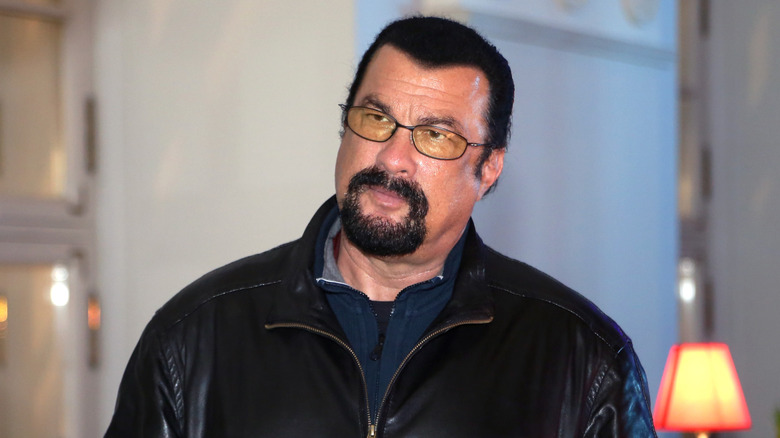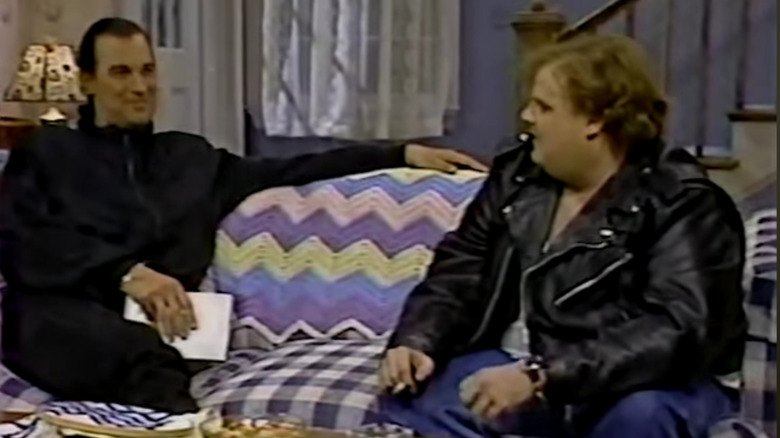12 Worst Moments Of Steven Seagal
The '80s and early '90s were the time of the steely, badass action movie star, and for awhile there, none were steelier or badass-ier than multiple black belt holder and aikido master Steven Seagal. What he lacked in acting ability, he made up for in the severely intimidating nature of his screen presence — that, and his bone-snapping fighting moves, which he executed with a frightening speed and economy of movement. His debut feature, 1988's "Above the Law," and its follow-up, 1990's "Hard to Kill," are bona fide action classics, and he hit his commercial peak with the 1992 thriller "Under Siege," which grossed north of $150 million worldwide. It wasn't long, however, before Seagal's fortunes — cinematic and otherwise —took a serious nosedive.
Beginning in the mid-'90s, Seagal's starring vehicles took a turn for the crappy, and by early in the next decade, his movies had been largely relegated to the direct-to-video pipeline. While Seagal managed to stay in the public eye, one could argue that perhaps he should not have — because more often than not, the news he made was of the bewildering and embarrassing variety. It was a long road that Steven Seagal took from "'90s action hero" to "strange and awkward man with nary a shred of self-awareness," and that road was fraught with many bizarre and cringeworthy bumps. Here are the worst of them.
Steven Seagal's martial arts demonstrations have become a bit lackluster
Steven Seagal has what one might call an interesting relationship with Russia. In 2015, he attended a tournament in the country focused on sambo, a modern grappling martial art created under the Soviet regime which has similarities to the more widely practiced Brazilian jiu-jitsu. Seagal was there to show off his skills in aikido, in which he holds a seventh-degree black belt — not that one could tell from his demonstration that he was anything other than a big, slow guy with a serious aversion to hugs.
Seagal was ostensibly showing the crowd how to use aikido to defend against multiple attackers, but those attackers (all two of them) were sporting a demeanor that was much more "bring it in, bro" than "here comes a butt-kicking." They patiently took turns "attacking" Seagal, which street thugs are not typically known to do, and theatrically collapsed to the mat in response to Seagal's gentle, nigh-loving pushes and twists. Seagal took far more punishment online for the demonstration than he doled out to his opponents, and as for the crowd in attendance, their puzzled silence throughout spoke volumes.
His fight scenes hit a low point
It's safe to say that Steven Seagal's once-formidable martial arts skills have diminished a bit over the last couple decades, and as a result, the action sequences in his direct-to-video fare have become questionable at best. His fight scenes may just have hit their nadir with the climactic sequence in 2016's generically titled "Code of Honor," which pitted Seagal against former "One Tree Hill" actor Craig Sheffer in a rooftop slap fight that was more unintentionally hilarious than viscerally thrilling.
When Seagal is actually visible on screen, he spends half the time looking like he's trying to calm down an unruly dog and the other half looking doddering and lethargic. When the scene cuts to a shot of the combatants in silhouette, only their outlines visible in the shadows, the action becomes slightly more intense — because quite obviously, this is when Seagal's visibly slimmer stunt double has taken over. The scene threatens to become outright parody for its duration — and near the end, it makes good on that threat when Seagal and Sheffer suddenly produce matching hunting knives from out of nowhere, with Seagal "menacingly" waving his around like a child who just found a particularly cool-looking stick on the playground. It's a sequence in which director Michael Winnick can't disguise Seagal's profound limitations as a contemporary action star — but in his defense, he barely tries.
He abruptly bailed on an interview
Steven Seagal has been known to be a bit of a tough interview subject, particularly when topics are broached by the interviewer that suggest he might be something less than the most respected figure in the entire world of martial arts and, indeed, entertainment as a whole. Seagal has been known to have harsh words for interviewers who fail to keep their lines of questioning sufficiently reverent — but in a 2023 interview with the BBC in which the topic of his multiple sexual assault allegations was broached, the actor responded in the opposite fashion. That is to say, with no words at all.
It should be noted that over the years, a slew of accusations of improper conduct by Seagal's peers, including the likes of Pamela Anderson, Jenny McCarthy, and Julianna Margulies, have never been litigated, and that a suit brought by model Faviola Dadis was not prosecuted due to being outside the statute of limitations. When interviewer Kirsty Wark brought up the allegations, though — framing the question as sympathetically as possible, and asking Seagal "how [he deals] with all that" — Seagal declined to declare his innocence and defend his famous name; instead, he simply removed his headset and dipped before Wark could even finish getting the words out of her mouth. "Steven Seagal there," Wark deadpanned, adding that the star had previously denied all the allegations against him (via the Independent).
If you or anyone you know has been a victim of sexual assault, help is available. Visit the Rape, Abuse & Incest National Network website or contact RAINN's National Helpline at 1-800-656-HOPE (4673).
The musical stylings of Steven Seagal were cringeworthy
There are only a handful of actors who have had pop hits, and it's safe to say that, talented as they may be as thespians, most of them should stay far away from microphones and musical instruments in any public capacity. In 2004, Steven Seagal helped to prove this truism by way of his LP "Songs From the Crystal Cave," a wild mishmash of genres, styles, and questionable lyrics that thankfully never got an official release in the United States. The album boasted a surprisingly robust roster of collaborators; songwriter-composer Greg Barnhill (who has worked with Tim McGraw, Trisha Yearwood, and others) helped out with the writing, and guest musicians from legendary singer Stevie Wonder to guitarist Al Anderson popped in for cameos.
Unfortunately, though, said collaborators couldn't do much for Seagal's lyrics and singing, which ranged from middle-of-the-road to blindingly awful. Most representative of the latter is "Strut," a reggae-ish track that sees Seagal crooning in an appalling attempt at a Jamaican patois about his craving for a certain part of the female anatomy; "Me want the –" Seagal sings, followed by a word that sounds objectively hilarious coming out of his mouth. Seagal followed the LP up two years later with a sophomore effort, "Mojo Priest," which mercifully garnered even less attention.
Steven Seagal buddied up to a ruthless dictator
Russian president Vladimir Putin is, to state the obvious, not a nice guy. He rules his country with an iron fist, invades neighboring countries willy-nilly, and is by any measure a full-blown war criminal, none of which stops some misguided individuals in ostensibly freedom-loving countries from admiring him. Among those individuals is none other than Steven Seagal, who has publicly admitted that he has been friends with Putin for a long time, considers him to be one of the greatest leaders in the world, and supported his 2014 invasion of Crimea — even playing a concert there after the dust had settled.
The feeling is apparently mutual (or, more likely, Putin has taken to humoring Seagal). In 2016, the actor — whose paternal grandparents were Russian immigrants — was granted Russian citizenship, and in 2023, Putin awarded him the country's Order of Friendship, which ostensibly honors those who have worked to improve international relations with Russia. During an event following the ceremony, Seagal slammed his own country's government for spreading "disinformation" and "lies" about Russia, saying (via the Independent), "Over half of the people in America actually love Russia and love Russians and know that they're being lied to," which seems a little optimistic on his part. Seagal even attended Putin's latest inauguration in 2024, and in a documentary released that year, flatly stated he would "die if need be" for his buddy.
Steven Seagal's most embarrassing on-set moment
The late judo master Gene LeBell (pictured) is a martial arts and Hollywood legend; he's trained with the likes of Chuck Norris and Benny "The Jet" Urquidez, won multiple championships in both judo and wrestling, and worked as a stunt performer or coordinator on dozens of major motion pictures. It was in this capacity that, on the set of the 1991 Steven Seagal vehicle "Out for Justice," LeBell allegedly humbled the big action star. As the story goes, Seagal claimed that his aikido training made him impervious to chokeholds and expressed his willingness to demonstrate this ability with LeBell's help. The judoka obliged Seagal, putting him in a hold which — again, allegedly — caused the actor to pass out then soil himself.
LeBell never confirmed or denied that this took place; the closest he ever came was during an interview with MMA journalist Ariel Helwani, telling him, "We had a little altercation or difference of opinion, there were 30 stuntmen and cameramen that were watching ... Sometimes Steven has a tendency to cheese off the wrong people, and you can get hurt doing that" (via Mixed Martial Arts). However, one of LeBell's most prominent students, MMA fighter Ronda Rousey, is apparently quite convinced of the story's authenticity. In a 2012 interview, she told Bleacher Report, "I would beat the crap out of Steven Seagal ... I would have to make him crap his pants a second time."
He inexplicably berated an interviewer
Once again, interviews have never been Steven Seagal's strong suit, but one sit-down in 2014 stands as a particularly egregious example of his seeming unwillingness to answer even the most basic questions without assuming a tone that is at once confrontational and self-aggrandizing. Throughout the conversation with ShortList, Seagal constantly posited himself as a picture of discipline and restraint, especially in contrast to other Hollywood actors, while offering curt and dismissive answers to most of the questions posed to him. Two queries in particular, though, inexplicably caused him to veer from dismissiveness into outright hostility.
The first pertained to whether he thought the violence in films such as "On Deadly Ground" took away from their social messaging, prompting this response: "I don't care about doing this interview. I really don't. So, if the questions are going to be like that, I probably won't continue ... I'm telling you, I don't really love the tone so far." After falling back to some even softer questions, the interviewer asked Seagal if he had any regrets about his forays into direct-to-video fare — a question which Seagal said was "leading back into a very provocative area" before cutting the interview short.
Steven Seagal literally beat up a co-star
John Leguizamo is one of the many stars who can't stand Steven Seagal, having co-starred with the actor in the 1996 military actioner "Executive Decision." On the podcast "Q with Tom Power," Leguizamo remembered that Seagal introduced himself to his fellow cast members by entering the room, barking that he was in charge and that his word was "the law," and asking if anyone had a problem. Leguizamo's problem: the inability to keep from snickering at what he rightly saw as dramatic overkill. Seagal's response, according to Leguizamo: "He tae kwon do'd my ass against the brick wall. He's six foot five and caught me off guard and knocked all the air out of me" (via Far Out Magazine).
Leguizamo is apparently a man who can hold a grudge, because over a quarter-century after the incident, he exacted a measure of revenge against Seagal. Speaking with Comic Book, he confided that he had based his character in 2022's "The Menu," an over-the-hill actor, on his one-time nemesis. "He beat me up once [during] a rehearsal; he's a bully," Leguizamo said. "I was playing a washed-up action star, so I thought he was perfect for it."
He participated in an ill-advised police raid
We can all agree that cockfighting is an awful, cruel "sport," and that people who organize and engage in this activity should go to jail. In the case of Jesus Llovera, though — a man who would eventually plead guilty to cockfighting-related offenses — it wasn't his sentence that was egregious, but the circumstances of his arrest. Llovera's home happened to be in Maricopa County, Arizona, which fell under the jurisdiction of sheriff's deputy Steven Seagal during the production of the third season of his A&E reality show "Lawman" — and the hardware and personnel employed during his arrest, which was filmed for the series, amounted to bringing a machine gun to a stick fight.
In addition to a ridiculous number of armed officers, County Sheriff Joe Arpaio (whose career would end in disgrace after it was found that he illegally detained immigrants) employed a phalanx of armored vehicles, including one that can only be described as a tank, which Seagal himself literally drove through the wall of Llovera's house. The arrestee claimed that over 100 roosters and a puppy were killed in the raid during a subsequent lawsuit — one that went nowhere but did prompt Seagal to issue a statement which no public figure should ever reasonably have to make. "I've been called a lot of things in my career, some of them not so kind," it read. "But to be labeled an animal abuser is beyond the pale" (via Hollywood Reporter).
He received a religious title seen by many as inappropriate
In TIbetan Buddhism, one of the highest titles one can receive is that of "tulku," which is one who is believed to be the reincarnation of a past Buddhist master. Tulkus, it is said, have made a conscious decision not to enter into Nirvana (the state of enlightened, eternal consciousness, not the band), but to return to Earth to continue their teachings and help others to achieve enlightenment. Those who receive the title are generally devoted, lifelong practitioners, often monks or teachers — and then there is Steven Seagal, who was bestowed the title in 1997 by the head of the Nyingma School of Tibetan Buddhism.
That this honor was given to an American action movie star was seen as controversial at the time, and the controversy has not decreased. It has been alleged that Seagal's, er, financial contributions to the school and to Penor Rinpoche, its head, may have played a part in his being given the title; this, of course, has been denied by all parties involved. Nonetheless, the honor has long been tough to swallow for both devout Buddhists and Hollywood types. In a blog post, Penor Rinpoche defended his decision and denied any accusations of impropriety, writing, "My concern is with the qualities I experienced within him which relate to his potential for benefiting others and not with the conventional details of his life which are wholly secondary."
Steven Seagal's refusal to rehearse got him all wet
Among the many actors who have stories about Steven Seagal's on-set behavior is Tom Arnold, who worked with the star on a 2001 thriller with the comically grim title of "Exit Wounds." Arnold has told the same story a variety of times, and the details never vary: During a scene being shot on a boat, Seagal refused to run through a rehearsal, which would have clued him in as to which of two doors he was supposed to walk through. As a result, when the time came to shoot, Seagal promptly went through the wrong door — one that opened directly onto the clear blue sea, in which the actor took an impromptu dunk.
In 2023, Arnold had a chat with Entertainment Weekly during which he disclosed that Seagal was well aware that he had been telling this story for years, and was none too pleased — that in fact, he was convinced that someone was paying Arnold to drag his good name. "If he had a sense of humor at all, he'd know that everybody I do movies with, I [have] a story," Arnold said. "You don't have to pay me to tell stories. The problem with him is he's got so many."
He was the worst host in the history of Saturday Night Live
There are a lot of folks, both musical guests and hosts, who have received bans from the TV comedy institution "Saturday Night Live" over the years. Most of them have been banned for things like letting fly with profanities, introducing controversial material, or otherwise going against the show's standards; not many have been banned simply for being an unfunny jerk. Enter Steven Seagal, whose hosting gig on April 20, 1991, is the most infamously terrible in the show's history — not only because Seagal acted like an abrasive prima donna toward the rest of the cast, but because he was apparently born without a funny bone.
Cast members of the era such as Julia Sweeney, David Spade, and Dana Carvey have all recalled how Seagal pitched shockingly awful sketch ideas, refused to be the butt of any joke, and insisted on a straightforward presentation of his badass action persona even when being featured in a sketch with Carvey and Kevin Nealon's obnoxiously silly bodybuilders Hans and Franz. In Tom Shales and James Andrew Miller's book "Live from New York: An Uncensored History of Saturday Night Live," cast member Tim Meadows perhaps put it best. "The biggest problem with Steven Seagal was that he would complain about jokes that he didn't get," he said. "You can't explain something to somebody in German if they don't speak German." Seagal was proclaimed the worst host ever by producer Lorne Michaels himself and slapped with a lifetime ban.
